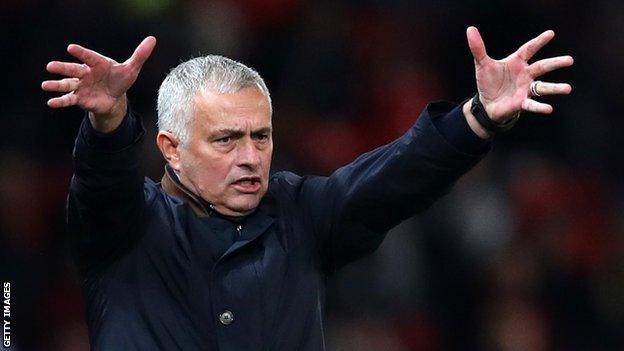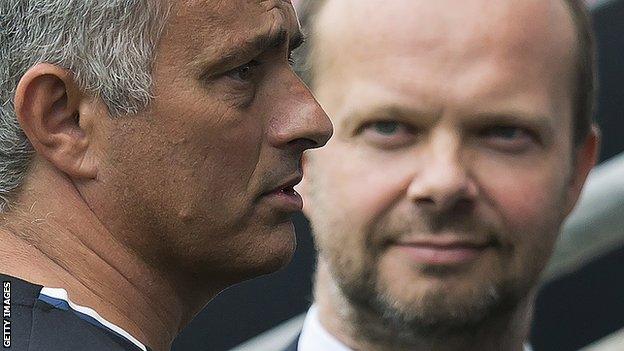Manchester United: Was Jose Mourinho right about state of club?
- Published
- comments

Jose Mourinho spent two and a half years in charge at Manchester United before being sacked in December 2018
Jose Mourinho has won two Champions Leagues, eight league titles and 10 cup competitions.
So when, the day before Manchester United's opening game of the season against Leicester in August, the then manager said he regarded finishing second in the previous campaign - 19 points behind champions Manchester City - as his greatest managerial achievement, few took him seriously.
Wind the clock forward nine months.
The gap to City has grown to 32 points. Mourinho is no longer United boss, sacked and replaced by Ole Gunnar Solskjaer. After a brief renaissance, they have slipped to sixth and failed to qualify for the Champions League for the third time in six seasons.
So, while it was felt at the time that Mourinho was being unnecessarily downbeat by highlighting the brilliance of being runners-up, was he right?
Was this, in fact, merely one example of Mourinho telling it how it really is? And if so, how do United put it right?
I'm too young to retire - Mourinho
'Time has spoken'
Mourinho knows his assessment of that last full season as Manchester United manager drew incredulity. But he meant it, repeating it recently in an interview with French newspaper L'Equipe on 15 May,, external five months after his Old Trafford exit, four days after his old club's sorry season ended with a home defeat by relegated Cardiff.
"I keep saying and thinking and feeling but time has spoken," said Mourinho. "The problems are still there."
Those issues are wide-ranging - "the players, the organisation and the ambition", according to Mourinho.
Senior sources at United reject this. They argue that the overwhelming desire of those who matter at the club is to reclaim their former status of English football's number one team.
Privately, it is emphasised that the vast commercial operation, which on its own has generated £208m in the nine months to 31 March, exists to service Old Trafford's footballing arm - not to generate profits for the Glazer family, who own the club, and pay the salaries of Ed Woodward and Richard Arnold, its two most senior executives.
Yet, somewhere, Manchester United have lost their way.
A club that finished outside the top two three times in 22 years before Sir Alex Ferguson's retirement in 2013 has managed one top-three finish since.
We don't deserve top four - Ole Gunnar Solskjaer
'I want two more players - I think I will get one'
United's decline has not been because of an unwillingness to spend.
Before Ferguson's exit, United had spent more than £25m on a player four times - Juan Sebastian Veron, Rio Ferdinand, Wayne Rooney and Dimitar Berbatov. Since 2013, they have done so on 14 occasions. This is less than Manchester City (16), but more than Chelsea (13), Liverpool (11), Arsenal (six) and Tottenham (five).
In a stuffy media room in the Michigan Stadium in Ann Arbor on 28 July last year, following a chastening 4-1 pre-season defeat by Liverpool, Mourinho expressed concern for the months ahead.
He was irritated at a perceived lack of transfer activity. Brazilian midfielder Fred (£47m) and young defender Diogo Dalot (£19m) had joined, along with third-choice keeper Lee Grant on a free transfer, but Mourinho demanded more.
"I want two more players," he said. "I think I will get one. For that one, I gave my club five names."
The two players would have been a left-sided attacking player, as Mourinho was ready to ditch Anthony Martial, and a central defender. Neither arrived.
Firstly, the proposed sale of Martial was blocked. Then, various reasons were identified why none of the central defenders, including Harry Maguire (too expensive), Jerome Boateng (injury-prone), Yeri Mina (agent's excessive demands) were deemed suitable.
It is impossible to know what would have happened had Mourinho got his way.
He had already signed two centre-backs earlier in his United tenure in Eric Bailly and Victor Lindelof, neither of whom established themselves as an authoritative presence at the back.
As it turned out, Mina has been a disappointment at Everton and Boateng has featured in 28 out of 47 games (60%) for Bayern Munich this season.
However, after conceding the most goals in a league season since they leaked 63 in 1978-79, it is inarguable that United's defence is a major cause for concern.
While Martial has at times played with a freedom missing in Mourinho's latter days, the fact he was limited to just seven minutes in the defeat by City on 24 April and played no part four days later in the must-win game against Chelsea - when the Frenchman's passive 'warm-up' was posted on social media and watched by more than 350,000 people - suggests manager Solskjaer is also having doubts.
This is a problem in itself as Martial signed a new contract in January that runs until 2024.

Jose Mourinho and executive vice-chairman Ed Woodward
'The coach nowadays needs a structure'
In the immediate aftermath of Mourinho's dismissal, officials at United made it known they would be addressing the appointment of a technical director as a priority. The idea was to have someone in place before a successor was appointed.
Eight weeks after Solskjaer was named permanent manager, the rough timeline to an appointment has been pushed back to the start of next season. Yet there is still no obvious sign United have a clear idea of the precise parameters of the role, let alone who they want to appoint.
Former players Rio Ferdinand and Darren Fletcher have both held discussions. Champions League-winning skipper Peter Schmeichel has put his name forward. Solskjaer's assistant Mike Phelan, previously sporting director at Australian outfit Central Coast Mariners, has also been linked with the job.
But do any of that quartet have the depth of knowledge across the European and South American game in particular required to be a success? How much are they aware of young players at United, let alone across the game as a whole? What are their contacts with agents like? Their negotiating skills? Their view of Solskjaer as a manager?
In his revealing interview with the BBC in March, former United manager Louis van Gaal said the structure was not the issue at Old Trafford, but the personnel filling the roles.
United's head of corporate development, Matt Judge, who like Woodward graduated from Bristol University, brokers the club's transfer deals and negotiates contracts.
On beIN Sports in January, Mourinho said: "The coach nowadays needs a structure. He needs a club organised in a certain way. The club must have an owner or a president, a CEO or executive director, a football director and then the manager. This is the structure that can cope with all the problems modernity is bringing all of us."
A technical director can come in many forms and, as United are aware, there is a delicate balance to be struck as relationships can quickly become fraught if differences of opinion, particularly with the manager, become apparent.
However, after another disappointing season when so many big names have failed to justify their price tag or reputation and the manner in which new contracts are handed out, or not, appears haphazard, the issue at United appears to be structural.
Some players 'need to get the finger out' - former Man Utd defender David May
'I don't believe some will make it'
Mourinho's last days at United were toxic. His confrontational approach to management was rejected as a relic of the past.
Relationships inside the dressing room and out had completely broken down, none more so that the one between Mourinho and Pogba, his £89m record signing.
In September, Mourinho told Pogba he would never captain the club again, so furious was he at being publicly undermined by the midfielder, who had claimed United's tactics limited their attacking and betrayed the club's traditions. By December, he was not even picking Pogba, who remained on the bench throughout Mourinho's last match in charge, a 3-1 defeat at Liverpool.
Four months earlier, Mourinho had questioned the mentality of his players, with Pogba one of those in the firing line.
"Both," Mourinho said when asked whether the quality or mindset of his squad must improve. "I trust some more than others will bridge the gap. Some I don't believe are going to make it."
When Solskjaer came in, with his warm smile and easy-going nature, he was viewed as being more in touch with the delicate touch needed to coax the best out of the current generation's high-profile players. Pogba responded positively. He scored nine goals and claimed seven assists in 12 games.
But the feel-good factor did not last long. Whispers from United's training ground once more hint at an unhappy dressing room.
Former United skipper Roy Keane is unimpressed. "There are too many bluffers at this club," he said on Sky Sports after last month's defeat by Manchester City. "These players threw Mourinho under the bus and they will do exactly the same to Ole."
The reality cannot be viewed in such black and white terms. Pep Guardiola's players are not always happy with their manager's relentless pursuit of perfection. They accept it because Guardiola's teams win.
United currently have a collection of big-names who do not fit a particular pattern of play and are being criticised every week because they are part of a high-profile team that does not win.
In addition, they will now miss out on very large potential bonuses because next season they will not be involved in the world's biggest club tournament.
It is perhaps no wonder some players are casting envious eyes elsewhere, and are willing to leave others to deal with the mess.
Solskjaer says Man Utd face 'long, hard journey' to get back to best
Finding the right path
Senior figures at United are acutely aware that a huge amount of work lies ahead.
Solskjaer and his coaching staff are expecting to preside over big changes in personnel this summer. The futures of Pogba, Martial, Alexis Sanchez, Romelu Lukaku and David de Gea are all in doubt. Ander Herrera and Antonio Valencia have already gone. Matteo Darmian looks certain to join them.
There is an acceptance that Woodward must make the funds available to reinvigorate the squad, allowing Solskjaer to mould it more in his own image.
The recruitment department must be more successful at identifying the right players to fill the right slots. The youth department must create the right pathway so talented youngsters Mason Greenwood, Jimmy Garner and Tahith Chong can reach their potential and brought into the first-team squad on a regular basis as United's tradition demands.
When they return for pre-season training on 1 July, before a two-and-a-half-week tour including stops in Perth, Singapore and Shanghai, United's players can expect to be worked much harder physically than in previous summers. Next season, the aim is for their fitness not to be questioned as it was this term.
It is from that platform that United will aim to clamber back to prominence, catch old rivals and repel new ones.
Solskjaer said recently that the gap to City and Liverpool was too big to close over a single summer, but the desire at United remains to compete for the Premier League title.
The problem is that United veered off the path to success after Ferguson's retirement and, since then, every effort to find it again has only succeeded in getting them more lost than before.